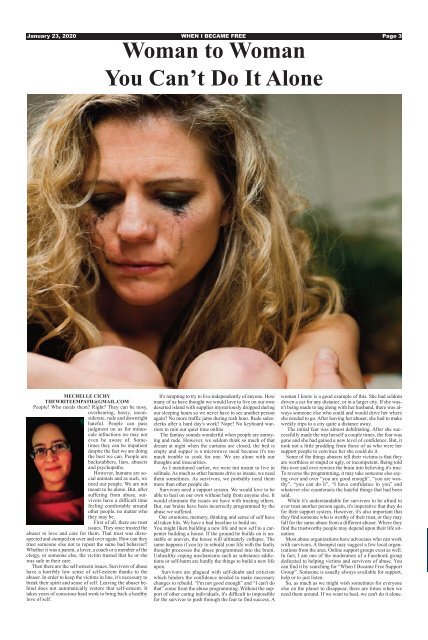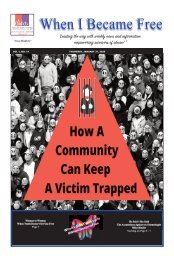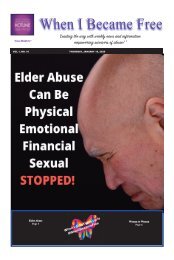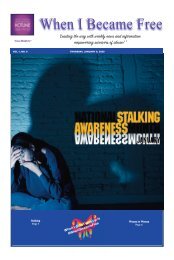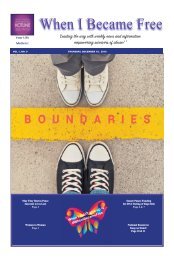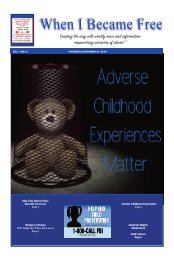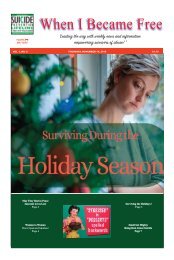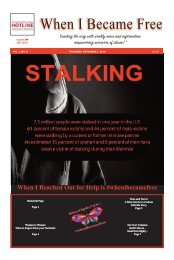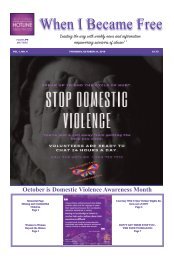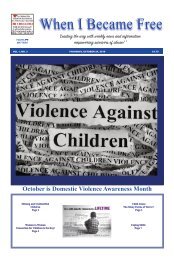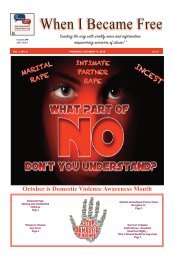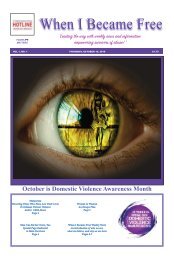Jan 23, 2020 When I Became Free
In this week's issue we focus on the topic of child sexual assault and what you can do to prevent it. Please share
In this week's issue we focus on the topic of child sexual assault and what you can do to prevent it. Please share
- No tags were found...
You also want an ePaper? Increase the reach of your titles
YUMPU automatically turns print PDFs into web optimized ePapers that Google loves.
<strong>Jan</strong>uary <strong>23</strong>, <strong>2020</strong> WHEN I BECAME FREE Page 3<br />
Woman to Woman<br />
You Can’t Do It Alone<br />
MECHELLE CICHY<br />
THEWRITEEMPATH@GMAIL.COM<br />
People! Who needs them? Right? They can be nosy,<br />
overbearing, bossy, inconsiderate,<br />
rude and downright<br />
hateful. People can pass<br />
judgment on us for minuscule<br />
infractions we may not<br />
even be aware of. Sometimes<br />
they can be impatient<br />
despite the fact we are doing<br />
the best we can. People are<br />
backstabbers, liars, abusers<br />
and psychopaths.<br />
However, humans are social<br />
animals and as such, we<br />
need our people. We are not<br />
meant to be alone. But, after<br />
suffering from abuse, survivors<br />
have a difficult time<br />
feeling comfortable around<br />
other people, no matter who<br />
they may be.<br />
First of all, there are trust<br />
issues. They once trusted the<br />
abuser to love and care for them. That trust was disrespected<br />
and stomped on over and over again. How can they<br />
trust someone else not to repeat the same bad behavior?<br />
Whether it was a parent, a lover, a coach or a member of the<br />
clergy, or someone else, the victim trusted that he or she<br />
was safe in their care.<br />
Then there are the self-esteem issues. Survivors of abuse<br />
have a horribly low sense of self-esteem thanks to the<br />
abuser. In order to keep the victims in line, it's necessary to<br />
break their spirit and sense of self. Leaving the abuser behind<br />
does not automatically restore that self-esteem. It<br />
takes years of conscious hard work to bring back a healthy<br />
love of self.<br />
It's tempting to try to live independently of anyone. How<br />
many of us have thought we would love to live on our own<br />
deserted island with supplies mysteriously dropped during<br />
our sleeping hours so we never have to see another person<br />
again? No more traffic jams during rush hour. Rude salesclerks<br />
after a hard day's work? Nope! No keyboard warriors<br />
to ruin our quiet time online.<br />
The fantasy sounds wonderful when people are annoying<br />
and rude. However, we seldom think so much of that<br />
dream at night when the curtains are closed, the bed is<br />
empty and supper is a microwave meal because it's too<br />
much trouble to cook for one. We are alone with our<br />
thoughts and insecurities.<br />
As I mentioned earlier, we were not meant to live in<br />
solitude. As much as other humans drive us insane, we need<br />
them sometimes. As survivors, we probably need them<br />
more than other people do.<br />
Survivors need a support system. We would love to be<br />
able to heal on our own without help from anyone else. It<br />
would eliminate the issues we have with trusting others.<br />
But, our brains have been incorrectly programmed by the<br />
abuse we suffered.<br />
Our emotions, memory, thinking and sense of self have<br />
all taken hits. We have a bad baseline to build on.<br />
You might liken building a new life and new self to a carpenter<br />
building a house. If the ground he builds on is unstable<br />
or uneven, the house will ultimately collapse. The<br />
same happens if you try to rebuild your life with the faulty<br />
thought processes the abuse programmed into the brain.<br />
Unhealthy coping mechanisms such as substance addictions<br />
or self-harm are hardly the things to build a new life<br />
upon.<br />
Survivors are plagued with self-doubt and criticism<br />
which hinders the confidence needed to make necessary<br />
changes to rebuild. “I'm not good enough” and “I can't do<br />
that” come from the abuse programming. Without the support<br />
of other caring individuals, it's difficult to impossible<br />
for the survivor to push through the fear to find success. A<br />
woman I know is a good example of this. She had seldom<br />
driven a car for any distance, or in a larger city. If she wasn't<br />
being made to tag along with her husband, there was always<br />
someone else who could and would drive her where<br />
she needed to go. After leaving her abuser, she had to make<br />
weekly trips to a city quite a distance away.<br />
The initial fear was almost debilitating. After she successfully<br />
made the trip herself a couple times, the fear was<br />
gone and she had gained a new level of confidence. But, it<br />
took not a little prodding from those of us who were her<br />
support people to convince her she could do it.<br />
Some of the things abusers tell their victims is that they<br />
are worthless or stupid or ugly, or incompetent. Being told<br />
this over and over rewires the brain into believing it's true.<br />
To reverse the programming, it may take someone else saying<br />
over and over “you are good enough”, “you are worthy”,<br />
“you can do it”, “I have confidence in you” and<br />
whatever else counteracts the hateful things that had been<br />
said.<br />
While it's understandable for survivors to be afraid to<br />
ever trust another person again, it's imperative that they do<br />
for their support system. However, it's also important that<br />
they find someone who is worthy of their trust, or they may<br />
fall for the same abuse from a different abuser. Where they<br />
find the trustworthy people may depend upon their life situation.<br />
Most abuse organizations have advocates who can work<br />
with survivors. A therapist may suggest a few local organizations<br />
from the area. Online support groups exist as well.<br />
In fact, I am one of the moderators of a Facebook group<br />
dedicated to helping victims and survivors of abuse. You<br />
can find it by searching for “<strong>When</strong> I <strong>Became</strong> <strong>Free</strong> Support<br />
Group”. Someone is usually always available for support,<br />
help or to just listen.<br />
So, as much as we might wish sometimes for everyone<br />
else on the planet to disappear, there are times when we<br />
need them around. If we want to heal, we can't do it alone.


